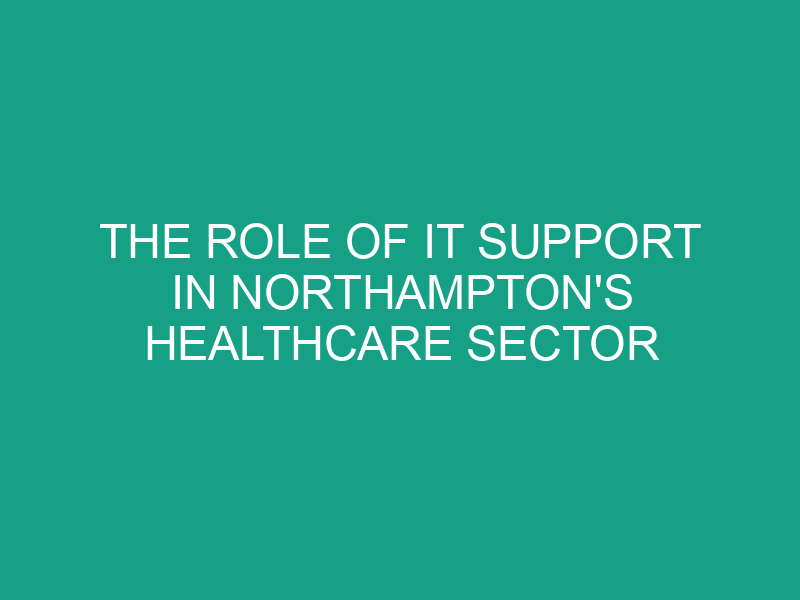
In Northampton, as in much of the world, the healthcare sector relies heavily on information technology to manage everything from patient records and lab results to hospital equipment and communication systems. The importance of IT support in this context cannot be overstated, as it ensures the seamless operation of healthcare services and enhances the quality of patient care.
This article explores the critical role of IT support in Northampton’s healthcare sector, detailing how it supports medical facilities, protects sensitive data, and contributes to overall healthcare improvements.
Essential IT Infrastructure in Healthcare
Supporting Critical Medical Operations
IT systems are integral to the daily operations of hospitals and clinics. They manage patient data, support diagnostic and treatment technologies, facilitate pharmacy information systems, and enable digital communication between departments. Effective IT support ensures these systems operate efficiently, minimizing downtime that can potentially affect patient care.
Enhancing Diagnostic Accuracy
Advanced medical equipment, such as MRI machines, CT scanners, and other diagnostic tools, rely on sophisticated software to operate correctly. IT support plays a crucial role in maintaining this software, ensuring updates and repairs are managed promptly to keep these devices in optimal working condition.
Data Management and Security
Protecting Patient Privacy
In the healthcare industry, protecting patient information is paramount due to strict regulatory requirements, including the General Data Protection Regulation (GDPR) and local data protection laws. IT Support Services in Northampton ensures that all systems are compliant with these regulations, implementing secure networks, data encryption, and access controls to safeguard patient data against unauthorized access.
Efficient Data Handling
Efficient data management systems are essential for organizing, storing, and retrieving vast amounts of medical data. IT support teams develop and maintain these systems, ensuring they are not only secure but also accessible to authorized personnel. This accessibility is crucial for providing timely and effective medical care.
Disaster Recovery and Business Continuity
Preparing for Emergencies
The healthcare sector must be prepared for all kinds of disruptions, from cyberattacks to natural disasters. IT support is critical in developing and testing disaster recovery plans that ensure data is backed up and can be quickly restored to maintain healthcare services without significant delays.
Ensuring Continuous Care
IT support helps healthcare facilities in Northampton implement reliable and redundant systems to ensure that critical functions remain available, even during system failures. This continuous availability is vital for areas like emergency rooms and intensive care units, where patient lives often depend on the uninterrupted functionality of medical devices and systems.
Integration of Emerging Technologies
Telemedicine Services
As telemedicine becomes more prevalent, especially highlighted during the COVID-19 pandemic, IT support is crucial in setting up and maintaining the technologies that enable remote patient care. This includes secure video conferencing systems, remote monitoring tools, and digital health records that are accessible from outside the hospital or clinic.
Implementing Artificial Intelligence
Artificial intelligence (AI) is becoming increasingly important in diagnostics, patient management, and personalized medicine. IT support teams are essential in integrating AI technologies into existing healthcare infrastructures, ensuring they function correctly and align with clinical goals and compliance standards.
Training and Support
Educating Healthcare Staff
IT support also includes training healthcare providers on how to use new technologies effectively. This training ensures that all medical staff are proficient in the digital tools at their disposal, which is crucial for maximizing the benefits of these technologies in patient care.
Ongoing Technical Support
Healthcare environments are dynamic, with continuous shifts in workflow and technology use. Ongoing IT support helps address any issues as they arise, providing real-time solutions to prevent disruptions in patient care and administrative operations.
Challenges and Considerations
Balancing Innovation with Security
One of the significant challenges in healthcare IT is balancing the adoption of innovative technologies with the need to maintain stringent security measures. IT support teams must navigate this balance carefully, ensuring that advancements in healthcare technology do not compromise patient safety or privacy.
Cost Management
Investing in IT support and new technologies can be costly, and healthcare providers must weigh these costs against the potential benefits. Effective IT support can help optimize technology use and ensure that investments are made strategically, enhancing ROI and patient outcomes.
Conclusion
In Northampton’s healthcare sector, IT support is not just a background operational necessity but a cornerstone of modern medical practice. It ensures the efficient operation of medical facilities, secures sensitive data, supports disaster recovery efforts, and facilitates the integration of cutting-edge technologies. As healthcare continues to evolve, the role of IT support will only grow in importance, becoming more integrated into the fabric of healthcare delivery and fundamentally enhancing the quality of patient care.